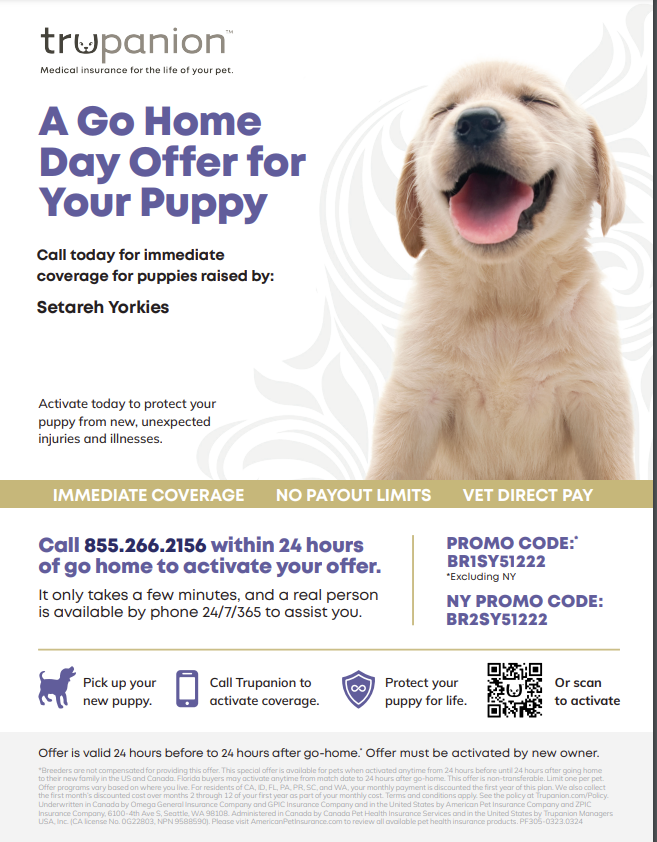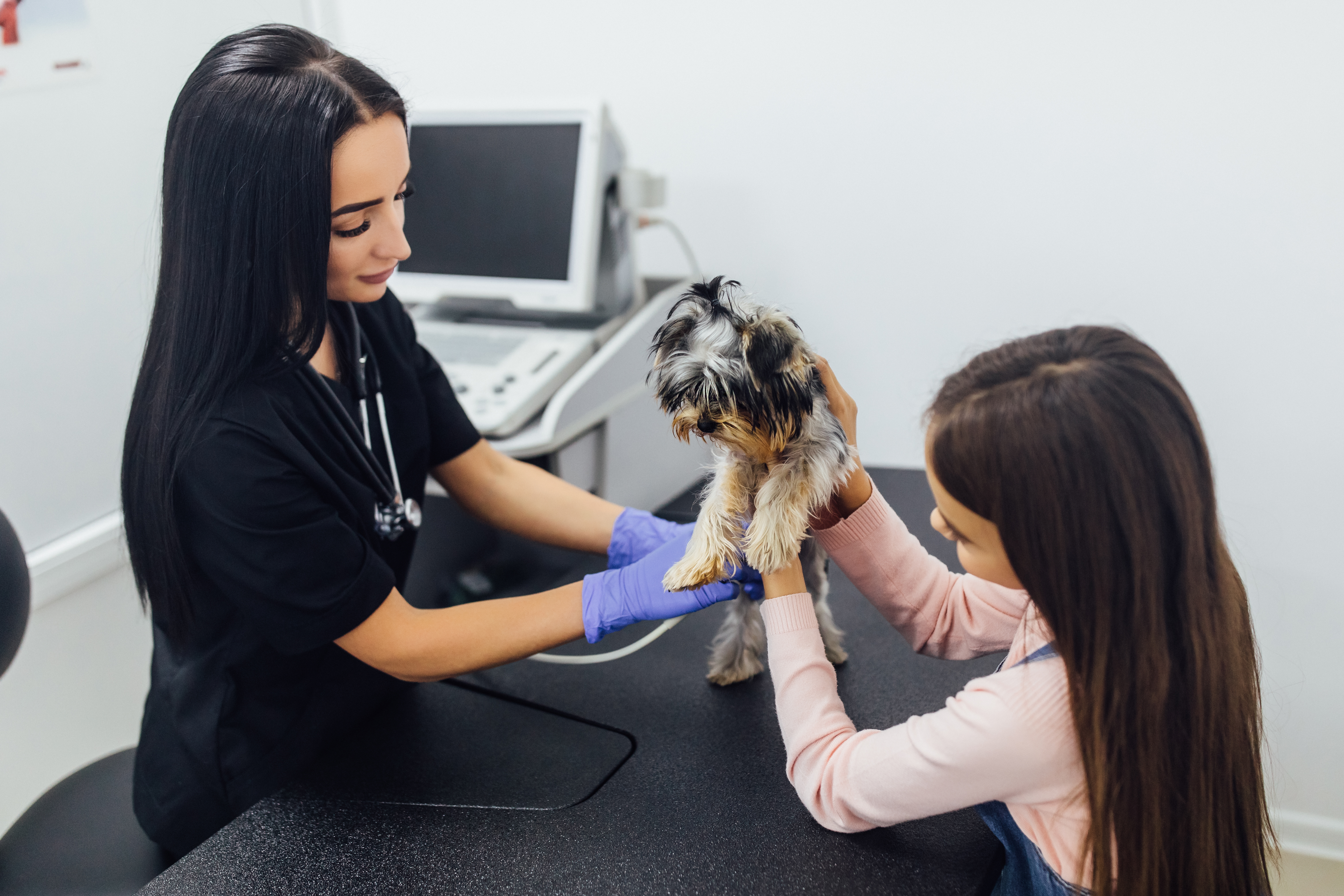 Pet doctor
photo created by artursafronovvvv - www.freepik.com
Pet doctor
photo created by artursafronovvvv - www.freepik.com
| Veterinary
Care | Just as we wouldn't over-vaccinate
humans, we shouldn't over-vaccinate our dogs. Overvaccination of dogs
has been linked to an increase in cancer and other disorders in recent
years. In addition, flea and tick treatments have caused severe disease
in several dogs, necessitating hospitalization and even death.
While we emphasize the importance of socializing your puppy during
their first 16 weeks of life, it is also critical to understand how to
do it properly so that your puppy is not exposed to hazardous
infections that can make them extremely sick, such as parvo. Parvo is
known for killing pups, and it may unfortunately be found in locations
like PetSmart, Petco, dog parks, veterinarian offices, and the pound.
To be deemed "vaccinated" against parvo and distemper, your puppy will
require three shots.
Before you pick them up, they'll get the first two rounds of
vaccinations. You'll give them the third round of vaccines when they're
12 weeks old, and the fourth and final vaccine when they're 16-18 weeks
old. Your puppy will not be entirely protected against parvo and
distemper until he or she has had the fourth vaccination at the age of
16 weeks. So you'll need to keep a close eye on where your puppy
travels and what he or she is exposed to till then. We also recommend
that you keep the rabies vaccination separate. |
Your puppy
will have the following vet care before you pick him/her up:
To
ensure they are healthy as possible
- Deworming at 3 weeks, 4
weeks, 5 weeks, 6 weeks, 7 weeks, and 8 weeks old
- A comprehensive vet checkup will
be performed during the checkup, and the original form will be kept in
the puppy notebook when they go home.
- The first 2 puppy vaccines in
the series of 4 vaccines covering Canine Parvo, Distemper, Adenovirus
and ParaInfluenza
- Microchip inserted between the
shoulder blades.
|
Click the
Medical Record, Health Record, & Health Certificate image below for
larger view | 
 | 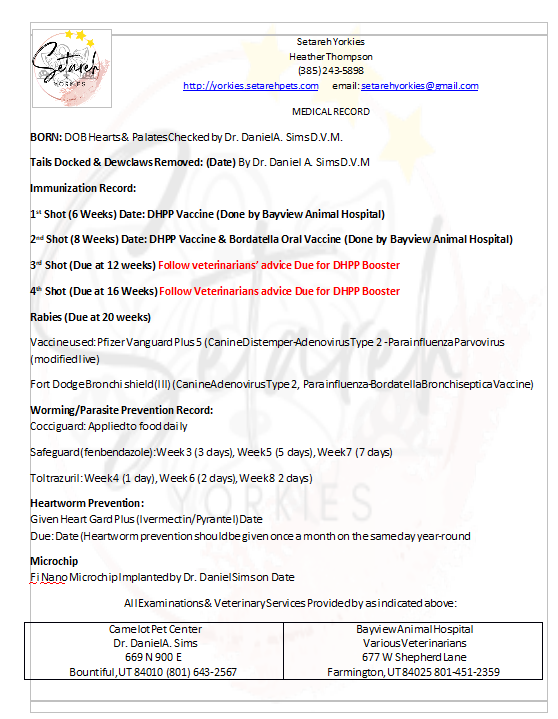 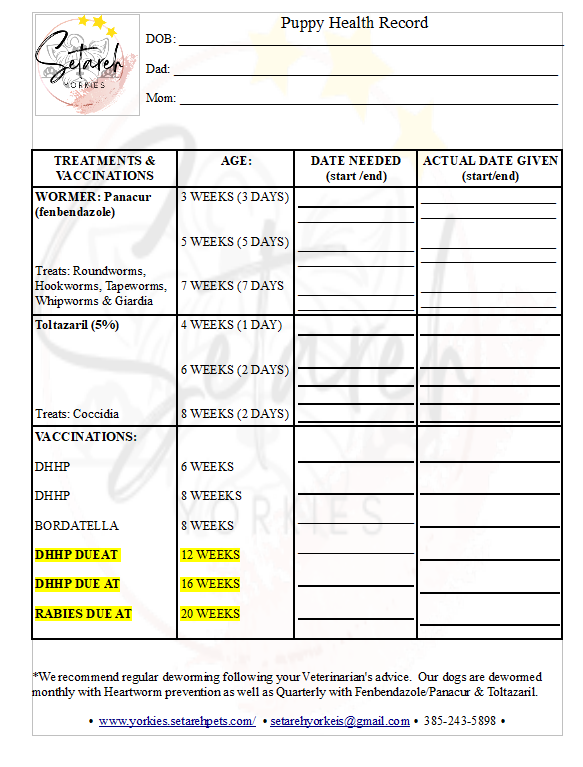 | 
 | 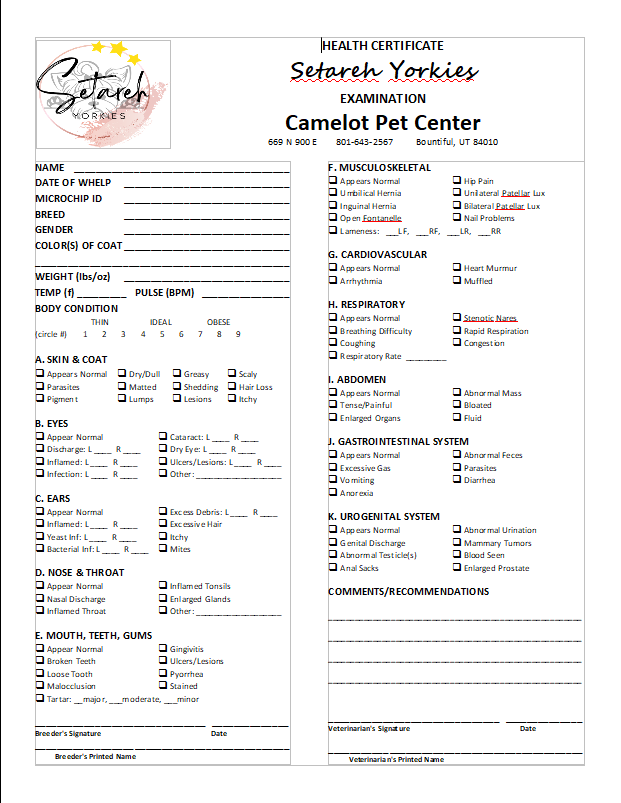 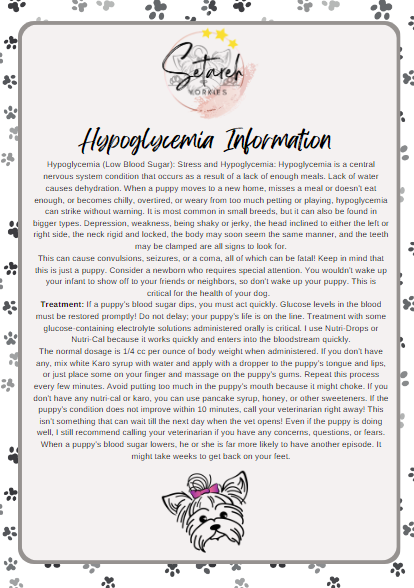 | Meet our Puppy Veterinarian:
We'd Like to Introduce you to
our puppy
Veterinarian
who has performed
a Vet Check up
on every puppy
Setareh Yorkies has produced. | 
Dr. Daniel A. Sims. D.V.M. |
|
Deworming
& Parasite Prevention
At Setareh Yorkies we start our deworming protocol
from before your puppies are conceived. We have carefully
tailored our deworming & parasite prevention protocol under the
guidance of our Veterinarian. We dose our mothers with dewormers
seasonally, at breeding, while pregnant. Our puppies start their
deworming at 3 weeks old and are dewormed weekly until 8 weeks of
age. You may see our exact protocol on our Medical Record shown
above & Below
ROUNDWORMS
Dirt or excrement that has become infected can harbor
roundworms. Mothers can pass it on to their puppies both before and
after delivery through nursing. This parasite, which resembles
spaghetti and is about 12 cm long, can give the appearance of having a
potbelly. Weight loss, weakness, nausea, diarrhea, or mucus in the
stool, as well as stunted growth, are possible symptoms.
HOOKWORMS
One of the most harmful intestinal parasites is
hookworm. Mothers can pass it on to their puppies both before and after
delivery through nursing. The degree of your puppy's lethargic state
may help you identify it.
You should also keep an eye out for symptoms like anemia, low appetite,
and bloody, black tar-like stools.
TAPEWORMS
When a puppy consumes the larvae of a
tapeworm from a host animal—such as a flea or a mouse—it can become
infected. Small, rice-like segments can be found in their stool or
around their anus, but there are no overt symptoms.
Your puppy may overeat due to mature tapeworms, but they won't gain any
weight.
WHIPWORMS
Whipworm will enter your puppy's
digestive system and result in persistent inflammation of the bowels.
You might experience diarrhea, weight loss, and mucus in your stools.
COCCIDIA
Tiny single-celled parasites called coccidia reside in the intestinal
wall of your dog. Although they are more common in puppies, they can
also infect cats and older dogs.
Dogs can contract an infection by consuming coccidia-containing soil or
other environmental materials that might contain dog feces.
Puppies are most frequently affected by coccidia, so it's critical to
have them checked for the parasite as soon as possible. A fecal test
can be used by your veterinarian to identify coccidiosis. Your
veterinarian can prescribe effective medication to your dog if it has
coccidia.
Can
my dog be affected by coccidia?
Dogs may not show any symptoms of coccidia, but puppies are typically
more severely affected. Diarrhea is the most typical symptom of
coccidiosis. Bloody diarrhea may be a symptom of more serious
infections. severe infections—particularly in young dogs.
What can I do to keep my dog from contracting coccidia?
By routinely clearing your dog's feces from your yard and other
locations where they relieve themselves, you can avoid coccidial
infections.
GIARDIA IN CANINE
A single-celled parasite called Giardia inhabits the intestines of
dogs. Although it most often affects puppies, it can also infect older
dogs. Dogs contract the disease when they ingest Giardia, which can be
found in contaminated water or other materials. It can also be
contracted from birds, bird baths, or from hens, ducks, or other birds
that have visited your property and carried the parasite. drinking
while camping from a dirty stream.
Giardia is a contagious disease that up to half of puppies will get at
some point in their lives, but it is easily treated. Can my dog be
affected by Giardia?
Many dogs that have Giardia do not develop any symptoms. Diarrhea is
typically the outcome of Giardiasis, a disease brought on by a Giardia
infection.
How can I keep Giardia from infecting my dog?
A safe and clean drinking water source for your dog is the best defense
against Giardia infection. It's crucial to keep dogs away from water
sources where other animals have deposited their waste.
To determine whether your dog has giardiasis, your veterinarian can
test the excrement of the dog. Your veterinarian can recommend a safe
and efficient treatment to manage the Giardia infection in your dog.
Pick up your dog's excrement as soon as possible to stop the spread of
Giardia (and other parasites). Make sure to use gloves, a
bag over your hand, or a scooping device to prevent coming into contact
with the excrement.
Products we use:
Safeguard
(fenbendazole)-Treats/prevents
roundworms, hookworms, lungworm, whipworm, and certain types of
tapeworms. Also used in the treatments of Giardia.
Toltrazuril- Used in the
prevention/treatment of Coccidia.
Cocciguard-
Used in the prevention/treatment of Coccidia
Dam/Mother:
Cocciguard:Applied to food daily
Safeguard (fenbendazole): At breeding (7 days), Day 47 pregnancy (7
days)
Toltrazuril: At breeding (2 days) Day 47 pregnancy (2 Days)
Puppies:
Cocciguard: Applied to food daily
Safeguard (fenbendazole): Week 3 (3 days), Week 5 (5 days), Week 7 (7
days)
Toltrazuril: Week 4 (1 day) Week 6 (2 days), Week 8 (2 days)
|
Leptospirosis Vaccination:
Read why we don't recommend the Leptospirosis vaccination here:
|
Core vs Non Core Vaccines
Small
breed dogs have a greater risk for vaccine reactions. The use of
NON-CORE vaccines such as Corona, Leptospirosis, Bordetella, Lyme, etc.
are not recommended unless these diseases are prevalent in the area;
and should NEVER be administered along with the CORE vaccines (Canine
Distemper, Adenovirus Type 2, Parainfluenza, Parvovirus), but rather
separately, and at a time when the pup’s immune system is mature.
Rabies vaccinations should be given as required by law, but NOT
coincident with any other vaccinations and preferably the puppy should
be at least 16 weeks of age or older. | Titer Testing for Vaccinations:
What is titer Testing? Read more about it here, here, or here:
|
Flea &
Tick Medication
***Please Note, if you
live in Utah, you do not have to worry about Fleas unless you are
traveling outside of Utah to an area where they are prevalent.
Same with Ticks, unless you live in an area infested wtih Deer, or go
hiking/camping a lot you don't need to worry about ticks. In 45
years of living in Utah, I've never had a tick on one of my personally
owned dogs.
To prevent flea and tick issues, your veterinarian may suggest
medications like Bravecto, Nexguard, Simparica, and Trifexis, as well
as generic versions of these drugs. Please bear in mind that the items
listed above will void your puppy's health warranty. A rising number of
these products are causing neurological problems in dogs, including
seizures and even death. When you sign your puppy's contract with us,
you'll be asked to agree that your puppy will never be given specific
flea/tick products like Bravecto, Nexguard, Simparica, or Trifexis, or
generic versions of these medicines.
We DO
NOT suggest or recommend Bravecto, Simparico, Nexgard or any other oral
flea/tick preventive. FDA Warning about Isoxazoline Products: Link
We propose Frontline Plus
or going completely natural with Food Grade Diatomaceous Earth and
Wondercide in place of these products. If you believe your yard has
fleas or ticks, it's a good idea to treat it with Food Grade DE before
bringing your puppy home. The Food Grade DE website has a lot of
information on how to use Food Grade DE to treat your yard. Just don't
inhale it; it's harmful to your lungs. When using, wear a face mask and
ensure that no animals or anyone are exposed to the airborne dust.
There are several advantages to going natural.
|
Trupanion Pet Insurance
The market for pet insurance is quite
new. It's comparable to human health insurance, but it's for dogs. Many
firms provide pet insurance with varying levels of coverage from which
to pick. An attachment for Trupanion Pet Insurance is attached. This
firm has a long history and a strong reputation. If you join up within
a 24-hour window on either side of taking your puppy home, they will
give you a 30-day trial period. We recommend Trupanion because they
have the best coverage for our dogs.
| Stay
Connected
You might wish to
join
us on Facebook or Instagram if you haven't already. This is generally
the first location where photos and videos appear. There is also a
private Facebook page for puppy owners. You may join this group right
now by answering a few simple questions. Setareh Yorkies Owners Group
is the name of the group. Grooming, veterinary care, training, and a
variety of other issues are covered. Our main Facebook page, not the
owners group, and our Instagram account are linked at the footer of
this page. The symbol will lead you to our pages if you click on it. |
|







